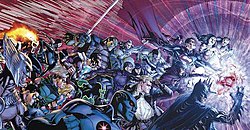Geoff Johns has wrapped up his Trinity War.
And it went out with a bang.
I have been sampling many online reviews of the story and most of what I have read has been fairly critical. So I may be in the minority with my praise of the work.
It also doesn’t help that the big reveal at the end of this story was broken all over the interwebs weeks in advance. That is a shame, because Trinity War is, above all, a mystery. It was a series of huge questions that propelled the story forward with action and suspense:
What is the nature of Pandora’s box?
Why did Superman do what he did?
Why was Superman getting sick?
Who was the mysterious Outsider?
Who was the traitor to the Justice League?
The final issue of Trinity War brought all three Justice Leagues to rescue Madame Xanadu. It seems that only John Constantine can handle the corrupting power of the Box. But the problem with a lying character like Constantine is that no one is willing to trust him with the dark object. But this leads to more corruption among the league members as they duke it out in epic fashion.
Ivan Reis art is fantastic! I would now put him on par with the A-list of artists I would pick for any special project. He style is clean and dynamic. It’s exciting to look at his creations as I breathlessly turned the pages.
A number of critics pointed out the lack of resolution in Trinity War. I could understand that if it wasn’t abundantly clear that this was only the set up for the big epic DCU crossover Forever Evil. Also, all of the above questions were answered in explosive fashion. The most gut-wrenching part was the revelation of the traitor and the consequence of their deception. And when the main villains behind this plot are revealed, it serves as a devastating blow to an already devastated Justice League.
My good friend Rick O. asked me recently if there has ever been a story where the heroes, like the Justice League, watch someone like Superman get demolished, causing them to flee in terror. I said that the answer is no, since a hero is defined by their courage.
But the end of Trinity War is the closest I’ve ever seen to the above scenario.
Forever Evil begins immediately after the events of Trinity War. All of the DCU villains are brought together by the main villains of Trinity War. They are all released from their respective prisons and they are allowed to become lieutenants in this “legion of doom.” But the abject cruelty and sadism of those in charge causes problems.
Geoff Johns is one of the best writers of villains. Anyone familiar with his work can talk about how he took one-dimensional bad guys like Captain Cold and Sinestro and imbued them with incredible depth and complexity. Many of these villains don’t see themselves as evil. What happens when they encounter indisputable evil?
The first issue continues the destructive path begun at the end of Trinity War. The focus is almost all on the bad guys of the DCU, never letting you forget that they are BAD guys, but also not painting them with too broad brushstrokes. Already you can see the seeds of complication.
David Finch’s art is much darker than Reis, which fits the project, but I have now become such a fan of the latter that the change is a bit of a let down.
But I am completely invested in Forever Evil and cannot wait to read what happens next.
4 out of 5 stars



No comments:
Post a Comment